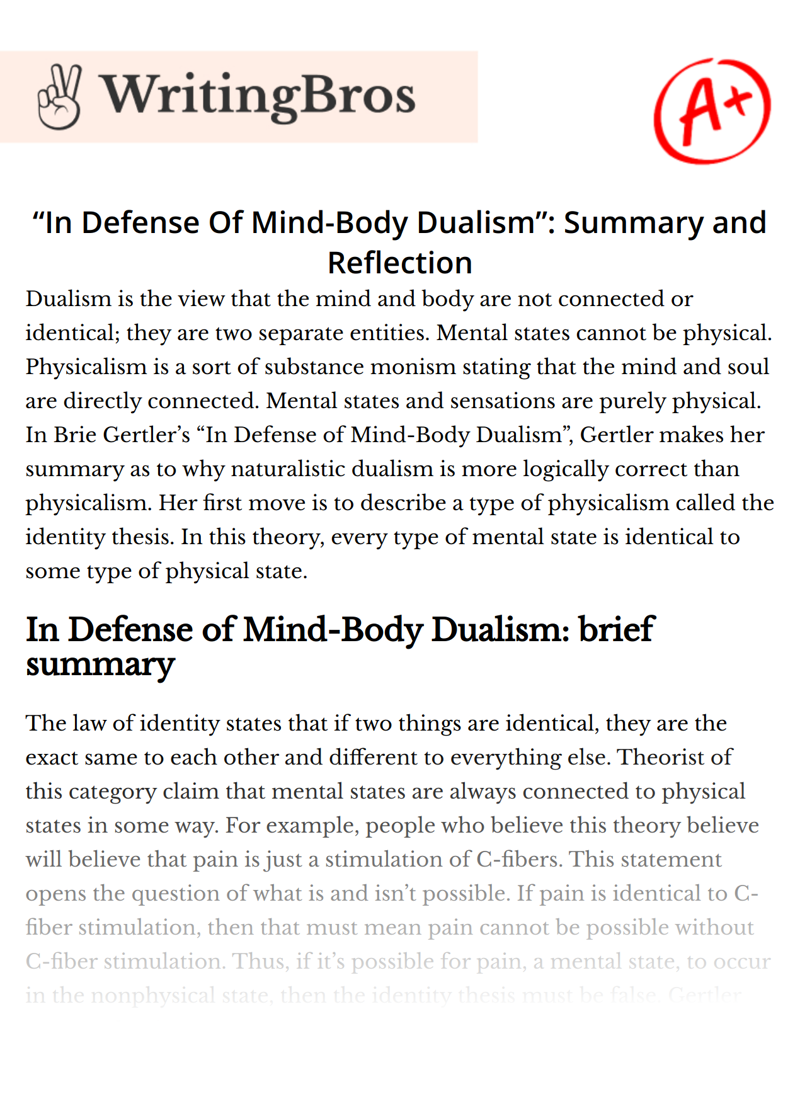“In Defense Of Mind-Body Dualism”: Summary and Reflection

Table of contents
- In Defense of Mind-Body Dualism: brief summary
- Reflection
- References
Dualism is the view that the mind and body are not connected or identical; they are two separate entities. Mental states cannot be physical. Physicalism is a sort of substance monism stating that the mind and soul are directly connected. Mental states and sensations are purely physical. In Brie Gertler’s “In Defense of Mind-Body Dualism”, Gertler makes her summary as to why naturalistic dualism is more logically correct than physicalism. Her first move is to describe a type of physicalism called the identity thesis. In this theory, every type of mental state is identical to some type of physical state.
In Defense of Mind-Body Dualism: brief summary
The law of identity states that if two things are identical, they are the exact same to each other and different to everything else. Theorist of this category claim that mental states are always connected to physical states in some way. For example, people who believe this theory believe will believe that pain is just a stimulation of C-fibers. This statement opens the question of what is and isn’t possible. If pain is identical to C-fiber stimulation, then that must mean pain cannot be possible without C-fiber stimulation. Thus, if it’s possible for pain, a mental state, to occur in the nonphysical state, then the identity thesis must be false.
Gertler proves why the identity thesis is false by explaining how it is conceivable for one to experience pain without having physical features. To Gertler, being able to conceive this scenario is proof that it is possible, therefore, disproving the identity thesis. Gertler calls this stance the Disembodiment Argument. She recognizes the fact that one may object to this argument by claiming that being able to conceive pain in the absence of physical features is not solid enough evidence to state that such a scenario is possible. She counters by arguing that if one full understands the concepts involved in the thought experiment, then conceivability is in fact good evidence to test for possibility. Furthermore, Gertler reasons that the way we understand pain is significantly comprehensive, being that we don’t conceptualize pain as an entity with a hidden essence because pain is what it is. On this note, the concept of pain is not at all the same as the concept of water. With the concept of water, identity theorists try to argue that we can conceive water being present in the absence of H2O, but this requires that we have no prior knowledge of chemistry. This could be possible if scientist were to come up with some new research revealing that water contains an additional element. The difference here is that to conceive the water concept, scientific investigation is required because of its hidden essence. Since pain has no hidden essence, it is sufficient to say that conceivability of pain in the absence of physical features is possible.
Reflection
As I read Gertler’s defense of naturalistic dualism, I understand her point of view and agree with her claims. For an argument to be valid it must be logical. For an argument to be sound, it must be valid and true. Brie Gertler in "In defense of mind-body dualism" exemplifies both qualities. In her deductive argument, Gertler gives us several Conceivability tests where we are to conceive certain scenarios. She first asks us to conceive a one-hundred-foot-tall book, which is very large, but perfectly imaginable. Gertler says, “According to Guinness World Record, the world’s largest book…is 5 feet tall by 7 feet wide”. From this we understand that a one-hundred-foot-tall book doesn’t exist, but you can still imagine its existence, which makes it possible. This argument is logical because the conclusion follows the premises. It is sound because the premise is true. She then asks us to imagine a married bachelor, but by definition, a bachelor cannot be married, so because it is not imaginable, it is impossible. After we think through these scenarios, Gertler presents us with our own “thought experiment” She tells us to pinch ourselves, imagine ourselves being disembodied. Even if we were disembodied, we would still be able to conceive of that pain. Because we can imagine feeling the pain if our arm wasn’t there, it is possible. So, if it is possible to experience pain without a body, then pain cannot be identical to C-fiber stimulation because in that theory, one cannot exist without the other.
Gertler’s arguments may be hard to comprehend at first but as she goes through and states her rebuttal to each Physicalist argument, her ideas become entirely plausible. By the end of her argument, one will be convinced that disembodied pain is imaginable, pain has no hidden essence, and because pain is not identical to C-fiber stimulation, the mind and body cannot be identical.
References
- Gertler, B. (2012). In defense of mind-body dualism. In Contemporary debates in philosophy of mind (pp. 3-20). Wiley-Blackwell.
- Descartes, R. (1985). Meditations on first philosophy. Hackett Publishing.
- Chalmers, D. (1996). The conscious mind: In search of a fundamental theory. Oxford University Press.
- Kim, J. (1998). Mind in a physical world: An essay on the mind-body problem and mental causation. MIT Press.
- Jackson, F. (1986). What Mary didn't know. The Journal of Philosophy, 83(5), 291-295.
Cite this Essay
To export a reference to this article please select a referencing style below

